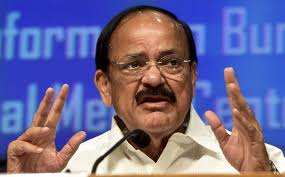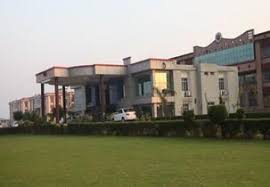
The Vice President of India, Shri M. Venkaiah Naidu has called for equipping youth with skills and knowledge required to successfully face the 21st-century job market. He stressed that the skilled labor force was vital for the country to make rapid economic progress.
Daily Current Affairs Quiz 2019
Speaking after inaugurating an exhibition put up by Andhra Pradesh State Skill Development Corporation (APSSDC) in the campus of the Swarna Bharat Trust, Vijayawada, Andhra Pradesh today, Shri Naidu observed that it was the time that India reaps the benefits of its demographic dividend by skilling its youth.
Pointing out that there was inherent talent in various sections of the society Shri Naidu said that the youth need to be trained and imparted skills in tune with the fast-changing technological scenario.
With India inching towards becoming the third-largest economy in the coming years, he said that the government and various industry bodies such as CII FICCI, ASOCHAM have to create infrastructure for skilling existing and new entrants to the labor force.
The Vice President also called for measures to reduce the urban-rural divide in terms of ensuring equitable growth and creating opportunities for youth and students to acquire skills.
Opining that it was important to nurture the talent of the youth to disrupt the status quo and lead to radical innovations, Shri Naidu called for creating an enabling environment for innovation to thrive. He also suggested steps to treat skill development as a National Mission and train the youth, women, and students to support innovation.
The Vice President wanted higher educational institutions to promote skilling and entrepreneurship among the youth. He also wanted the academia and the industry to join hands to make students familiar with the skills required for the 21st-century jobs.
The Vice President went around the exhibition and visited stalls displaying various programs offered by the government of Andhra Pradesh for students to update their skill sets. Students from various Engineering colleges and trainees of Swarna Bharat Trust were made aware of the schemes.
The Governor of Andhra Pradesh Shri Biswa Bhusan Harichandan who participated in the event also accompanied the Vice President during his visit to APSSDC exhibition and later was shown around various training centers at Swarna Bharat Trust.
Shri Challa Madhusudhan Reddy, the Chairman of APSSDC, Shri Kamineni Srinivas, Chairman of Swarna Bharat Trust and other dignitaries were among those present at the event.
What is Skill Labor ?
A skill labor is one who is capable of working efficiently and supervises efficiently the work of skilled employees.
The Difference Between Skilled labor and Unskilled Labor
The Skilled labor requires workers to possess specific talents that are utilized within an industry such as the engineers, welders, electricians, water supply specialists, and many others who need highly specialized training and experience to fulfill particular needs. Skilled labor doesn’t just do the job either. Sometimes, they can contribute to re-thinking how the job is done and employing new techniques and technologies when suitable.
On the other hand the unskilled labor simply refers to workers who lack technical training and expertise. Unskilled labor jobs are just as crucial as skilled labor jobs. The unskilled labor usually doesn’t have the training requirements of skilled labor, talents for managing, operating machinery, and implementing procedures are still highly valued. This means that unskilled labor must also be matched well to businesses.
Skill Development for Economic Growth
Skill development is most important for the functioning and growth of the economy, but how important are they compared to other factors that influence the growth of GDP? Surprisingly, estimates from the Bureau of Labor Statistics Multifactor Productivity Program suggest that educational attainment may not be as important for economic growth as the recent focus on education and skills implies. The BLS data indicate that changes in the composition of the labor force, largely due to education, accounted for only a small fraction (7%) of the growth in labor productivity in the U.S. private business sector over the period 1995 to 2007 (the last year before the Great Recession). Robert Solow famously remarked in 1987 that “you can see the computer age everywhere but in the productivity statistics”; in the current context, one might say that we can see the revolution in educational attainment everywhere but in the productivity statistics.
Skill Development Challenges in India
Alongside the daunting challenge of skilling millions of youth entering workforce each month, India also faces a huge challenge of evolving a skill development system that can equip the workforce adequately to meet the requirements of the industry. The workforce needs to be trained across four levels, from the high end specialised skills for ‘White Collar’ jobs to the low-level skills of the ‘Rust Collar’ jobs. Moreover, these skills have to be adequately linked to the available job opportunities. Several factors have inhibited the skill development eco-system in India to scale up to the desired levels. The skill development system in India is plagued with multiple issues related to awareness, perception, cost, quality and scale.
Importance of Skill Development in India
To develop Indian Economic Powerhouse, India needs to equip its workforce with employable skills and knowledge to make India a developed economy. India is today one of the youngest nations in the world with more than 62% of the population in the working age group (15-59 years), and more than 54% of the total population below 25 years of age. In fact, in next 20 years, the labor force in the industrialised world is expected to decline by 4%, while in India it will increase by 32%. However, current statistics shows that only 2% of the total employees in India have completed skills development training. In today’s age of globalisation and technological volatility, skill building is an important instrument to increase the efficacy and quality of labor for improved productivity and economic growth.
Skills and knowledge development are the driving forces behind the financial growth and community development of any country. Skill building is a powerful tool to empower individuals and improve their social acceptance. It must be complemented by economic growth and employment opportunities to meet the rising aspirations of youth. The challenge lies not only in a huge quantitative expansion of facilities for skill training, but also in raising their quality. India can then become the global sourcing hub for skilled employees.
Following is the text of Vice President’s address:
“I am delighted to be present here and go around the exhibition put up by Andhra Pradesh State Skill Development Corporation (APSSDC) displaying information about the courses and different programs run by the state for the benefit of students and youth.
I am happy that students from various Engineering Colleges and the trainees of Swarna Bharat trust are getting a good exposure through this fair.
I was informed that Andhra Pradesh Government has formed 7 different Missions to achieve double-digit growth for the state and to make AP among the most developed state in the country. Among these, the Knowledge and Skills Mission has been formed to provide trained and skilled manpower to all other Missions.
I appreciate the efforts of the government to touch 20 million people in AP in next 15 years and provide them skilling and entrepreneurship to meet skilled human power demands of all Missions and shape AP as the hub for skilled-workforce and knowledge.
As we look forward to make India a global economic superpower and an epicenter of knowledge, we must ensure that we create an enabling environment for innovation to thrive. Innovation must be complemented by creating a skilled manpower by tapping the huge demographic potential in the country.
It is widely acknowledged that India has the advantage of Demographic dividend. The demographic dividend is the economic growth potential that can result from shifts in a population’s age structure, mainly when the share of the working-age population is larger than the non-working age share of the population.
India is a young, aspirational country. 65% of our population is below 35 years of age. 62% of our population is in the working-age group of 15-59 years. We have a workforce of 48 crores and more than a crore join the workforce every year.
It is the right time that we reap the benefits of our demographic dividend by providing skills. Skills and knowledge are driving forces of economic growth and social development for any country.
As we aim to become a developed country with a $5 trillion economy, it is important to have skilled manpower with the needed skill sets in various sectors to spur growth. It is also important to reduce urban- rural divide in terms of ensuring equitable growth and creating opportunities.
We also need to equip our students with effective communication skills. Mere degrees and diplomas will not make a person employable. For instance, a NASSCOM Survey (2011) found that only 25 percent of the graduates working in the IT sector have the required skills.
Therefore, your degree and diploma need to be supplemented by appropriate skills to take full advantage of the innumerable opportunities in the globalized and liberalized economic environment.
It is important to nurture the talent of our youth to disrupt the status quo and lead to radical innovations. Aligned with our growing economic profile, we have promoted skill development as a National Mission.
Universities should not only be the knowledge hubs but also need to emerge as the hotspots of research, incubation, and innovation. There is a great need to build a strong research ecosystem by collaborative, inter-disciplinary and multi-disciplinary research initiatives.
Expenditure on Research and Development is a key indicator of private and public sectors effort to foster competitive advantage of Science and Technology. But in India, public expenditure on Research and Development is rather low.
Empowering the youth by skill-building is a powerful tool in current times. It will enhance the efficacy and quality of the work for improved productivity and growth in the future.
I am happy to learn that more than a crore youth are being imparted skill training annually under various programmes of the Government. 56 lakh youth have been trained under flagship Pradhan Mantri Kaushal Vikas Yojna, since its inception.
I am happy that government at the Centre and several state governments have been focusing on providing training courses and modules based on Industry requirements.
Our country is poised for a big transition. Youth are the agents of this transformation. I call upon each one of you to use the available programmes and expanded opportunities.
India is transforming and reinventing itself rapidly, inspired by PM Modi’s call to you “Reform, Perform and Transform”.
I urge each one of you to keep learning and improve your skills. Be lifelong learners.
Universities, higher education institutions must work with corporate firms and other industries to make students familiar with the skills required for the 21st-century technology-dependent job market.
We must build the required infrastructure for skilling existing and new entrants to the labor force. Here I would urge the Industry and Industry bodies such as FICCI, ASOCHAM, and others to play a more pro-active role in creating skilled manpower for various sectors.
I would also call upon every institution providing higher education to have a dedicated department to promote skills and entrepreneurship. Such a department must empower students to seek opportunities in entrepreneurship as well.
Thank you, Jai Hind!





